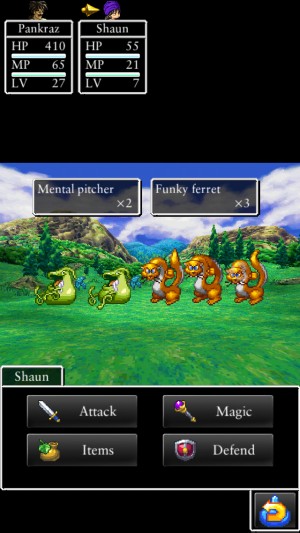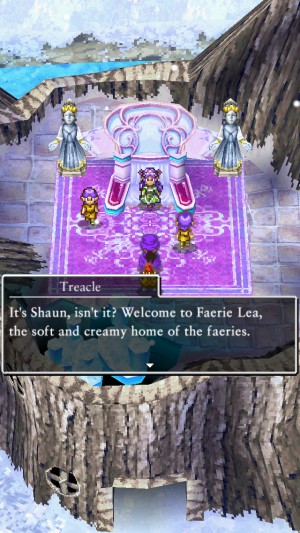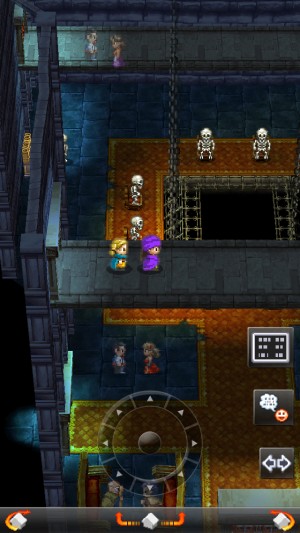 Dragon Quest 5 ($14.99) is a rare jewel. This is a game that carried the burden of being a sequel in one of the most successful franchises of all-time. In the pre-merger days, it’s safe to say that Enix as a company depended on the performance of Dragon Quest games. It’s the very definition of a AAA installment in the middle of a long-running series. Such products are not where we would expect to find the unique voice of the game’s creator telling such a small and personal tale. That’s just what designer and writer Yuji Horii did, however, and the result is perhaps one of the finest stories ever seen in an RPG. In my opinion, the series was never able to top this installment, but that’s fine, because not many games in general have.
Dragon Quest 5 ($14.99) is a rare jewel. This is a game that carried the burden of being a sequel in one of the most successful franchises of all-time. In the pre-merger days, it’s safe to say that Enix as a company depended on the performance of Dragon Quest games. It’s the very definition of a AAA installment in the middle of a long-running series. Such products are not where we would expect to find the unique voice of the game’s creator telling such a small and personal tale. That’s just what designer and writer Yuji Horii did, however, and the result is perhaps one of the finest stories ever seen in an RPG. In my opinion, the series was never able to top this installment, but that’s fine, because not many games in general have.
For a long time, Dragon Quest 5 was one of those games that got away as far as English fans were concerned. It was released for the Super Famicom in Japan in September of 1992, where it sold nearly 3 million copies, an absolutely titanic number in those days. Since the first four Dragon Quest games had been released overseas and Enix of America was still kicking around, no one had any reason to doubt that English fans would receive a localized version. Unfortunately, due to technical issues that Enix has never elaborated on, it was passed over. Dragon Quest 6 was then planned to be released as Dragon Warrior 5, but Enix of America’s luck ran out before that could happen. Given the headaches that Square would later go through to straighten out the misnumbered Final Fantasy games, perhaps that’s a good thing.
 The next chance for English gamers to see this game wouldn’t come for more than 10 years. In 2004, Dragon Quest 5 received its first remake. Built for the PlayStation 2, it offered enhanced graphics, the ability to have up to four members in your party at a time instead of the original limit of three, and amazing new renditions of the soundtrack. Unfortunately, this version would also remain exclusive to Japan as the newly-formed Square Enix opted to focus on relaunching the brand with Dragon Quest 8 ($19.99). It was beginning to look like the game would never be officially available overseas. Luckily, a remake was planned for release in 2008 for the Nintendo DS, and with Square Enix pushing the brand hard in the West at that time, a release was finally assured. Sadly, due to the weak performance of the Western release of Dragon Quest 4 ($14.99) on the DS, Dragon Quest 5 was produced in very limited supplies, making it pretty scarce for a long period after its release. Square Enix eventually produced more copies here and there, but it’s never been cheap or easy for English gamers to get a hold of, until now.
The next chance for English gamers to see this game wouldn’t come for more than 10 years. In 2004, Dragon Quest 5 received its first remake. Built for the PlayStation 2, it offered enhanced graphics, the ability to have up to four members in your party at a time instead of the original limit of three, and amazing new renditions of the soundtrack. Unfortunately, this version would also remain exclusive to Japan as the newly-formed Square Enix opted to focus on relaunching the brand with Dragon Quest 8 ($19.99). It was beginning to look like the game would never be officially available overseas. Luckily, a remake was planned for release in 2008 for the Nintendo DS, and with Square Enix pushing the brand hard in the West at that time, a release was finally assured. Sadly, due to the weak performance of the Western release of Dragon Quest 4 ($14.99) on the DS, Dragon Quest 5 was produced in very limited supplies, making it pretty scarce for a long period after its release. Square Enix eventually produced more copies here and there, but it’s never been cheap or easy for English gamers to get a hold of, until now.
Dragon Quest 5 tells a story about destiny and heroism from a rather unique point of view. The game starts with the birth of the protagonist, following him through childhood, young adulthood, meeting the love of his life, getting married, and having children of his own. While it’s a fairly linear story, you do have to make one very big choice partway through the game. There are three possible candidates to choose as the main character’s wife, including his childhood friend Bianca, the gentle and sweet Nera, and her, uh, interesting sister Debora. While the broad strokes of the story will play out similarly regardless of who you choose, the three different brides make for very different conversations along the way, to say nothing of the individual skills they contribute to the party. Also, the wife you choose determines your children’s hair color, so if you want to write Dragonball Z fanfic with your playthrough, you’ll want to go with Bianca or Debora, depending on your feelings towards Super Saiyans.
To be clear, the story is the best part of Dragon Quest 5. I don’t want to say much for fear of spoiling anything, but it’s got a lot of things to say about life, the hopes we foster, the tragedies we bear, and the burdens of legacies. The main character’s life is a hard one, and while there’s a deep sense of sadness about it, there are also a lot of moments of joy. I’ve been fortunate enough to replay this game at various stages of my life, and I get something different out of it each time. It’s all told in such a measured and layered manner that it’s little wonder few other stories come close in a genre well-known for clubbing the player over the head with melodrama. I’ve played a lot of RPGs, and there’s nothing else out there with a story quite like this one. That’s all I’m going to give you on that. You’ll have to play it yourself if you want more.
 The gameplay is less unusual, following the typical rules and systems we’ve already seen in a number of Dragon Quest games. Job classes, already reduced in importance in Dragon Quest 4, are gone entirely. Functionally, it’s not so different from that game, however, as each character has their own stats and skill progression that are pre-set. This means certain characters are better fighters, while others are stronger at offensive magic or healing, and so on. While individual characters can’t be customized beyond the stat-boosting seeds you’ll find here and there, Dragon Quest 5‘s main new gameplay feature makes up for that. The protagonist has a special affinity with monsters, allowing him to recruit them to fight alongside him. You can pick up almost any regular monster in the game in this way, and for a stretch in the middle of the game where friends are few and far between, you’ll have to make some use of this ability. It’s up to you how fully you want to exploit it, but it’s worth mentioning that recruiting monsters is a matter of sheer luck, so it takes time and a whole lot of patience if you’re trying to build a particular team.
The gameplay is less unusual, following the typical rules and systems we’ve already seen in a number of Dragon Quest games. Job classes, already reduced in importance in Dragon Quest 4, are gone entirely. Functionally, it’s not so different from that game, however, as each character has their own stats and skill progression that are pre-set. This means certain characters are better fighters, while others are stronger at offensive magic or healing, and so on. While individual characters can’t be customized beyond the stat-boosting seeds you’ll find here and there, Dragon Quest 5‘s main new gameplay feature makes up for that. The protagonist has a special affinity with monsters, allowing him to recruit them to fight alongside him. You can pick up almost any regular monster in the game in this way, and for a stretch in the middle of the game where friends are few and far between, you’ll have to make some use of this ability. It’s up to you how fully you want to exploit it, but it’s worth mentioning that recruiting monsters is a matter of sheer luck, so it takes time and a whole lot of patience if you’re trying to build a particular team.
One thing I love in this game is how it weaves the narrative into the gameplay in thoughtful ways. When you start the game, you’re a mere child, not well-suited to battling monsters on your own. Fortunately, your father is there to watch out for you, and he commands the sort of awe you would expect from the perspective of a boy looking at his father. You’ll soon start to hold your own, and someday, your father’s strength will seem a lot less out of the ordinary, though his character remains a source of admiration. Another interesting way these two elements intersect during the childhood portion of the game is in the many books and signs you’ll find. Such things are so commonplace in RPGs that any seasoned player will go right for them and check them, only to find that the main character is still too young to read difficult words. You can come back later when you’re older and see what you missed, but I felt that was a nice little touch.
The passage of time in the game also allows it to throw a bunch of bricks up in the air that land much later on. It’s neat when these nested plot elements finally hatch, recalling things that may have slipped your mind up until the very moment that they make their way back into the story. Even with how much I like this game, I have to admit there are a few things it doesn’t do quite so well. It’s always been a problem how much the game favors one of the brides, to the point that it’s hard not to choose her. A scene was introduced in the remakes to try to make some kind of connection with Nera, but there’s never a strong case made for choosing her. Adding her sister, a complete pain in the neck who is nevertheless the most entertaining choice, only serves to overshadow her even more. Most people will choose Bianca, and the game seems to want you to do that. There’s a lot of interesting stuff to experience with the other choices, so keep that in mind. It at least makes for interesting replays, provided you’re down with replaying a 30 hour game.
 Dragon Quest 5 is using the same engine as Dragon Quest 4, carrying over most of its features and quirks. The game is usually played from an overhead perspective, but you can swing the camera to have a better look around you or just give yourself a more cinematic angle. Unlike Dragon Quest 4, the music doesn’t restart every time you go in and out of battle, allowing you to hear the full overworld and dungeon tracks without deliberating hanging around listening to them. Aside from the camera options, the UI is identical to every other Dragon Quest game released on mobile so far. The game is portrait-only, and although it allows you to move the UI elements around to an extent, it certainly seems designed for one-handed play on an iPhone. The game features iCloud support, but its save system is irritatingly similar to its DS implementation. You can make a permanent save in churches and a quicksave in the field, but inside dungeons and towns, you can’t save your game at all. On the DS, you could just put the system into sleep mode, confident your game wasn’t going anywhere, but the way iOS manages its memory makes suspending the game without saving an entirely more risky proposition, especially in the middle of a long dungeon.
Dragon Quest 5 is using the same engine as Dragon Quest 4, carrying over most of its features and quirks. The game is usually played from an overhead perspective, but you can swing the camera to have a better look around you or just give yourself a more cinematic angle. Unlike Dragon Quest 4, the music doesn’t restart every time you go in and out of battle, allowing you to hear the full overworld and dungeon tracks without deliberating hanging around listening to them. Aside from the camera options, the UI is identical to every other Dragon Quest game released on mobile so far. The game is portrait-only, and although it allows you to move the UI elements around to an extent, it certainly seems designed for one-handed play on an iPhone. The game features iCloud support, but its save system is irritatingly similar to its DS implementation. You can make a permanent save in churches and a quicksave in the field, but inside dungeons and towns, you can’t save your game at all. On the DS, you could just put the system into sleep mode, confident your game wasn’t going anywhere, but the way iOS manages its memory makes suspending the game without saving an entirely more risky proposition, especially in the middle of a long dungeon.
Dungeons can be pretty elaborate in Dragon Quest 5. While the iOS versions of DQ4 and DQ5 share an engine, it’s important to keep in mind that there was a generational difference in the hardware they were originally designed for. This allowed Dragon Quest 5 to greatly increase the scale of its dungeons, events, and encounters, making for a much more complicated and satisfying gameplay experience. The locations in this game make far greater use of vertical elements than the previous games, resulting in the best dungeons of any installment of the series we’ve seen on iOS yet. The world feels more natural and less condensed than the previous games, as well. The English version still makes heavy use of accents, a practice that different people can take or leave, but they are considerably toned down from Dragon Quest 4. The puns, on the other hand, are perhaps even more thickly layered on, and they sometimes take the mood in a different direction from what the original scene is calling for. The localization is still pretty strong on the whole, and if nothing else, it’s certainly enjoyable to read.
If you like RPGs, you should buy Dragon Quest 5. I consider it one of the peaks of the genre, its highest points yet to be surpassed in the more than 20 years since its release. If you only play one Dragon Quest game, this is it right here. The series still hasn’t managed to top this one, and given how much obvious heart and soul was put into the game, I doubt it ever will. I wish the save system was handled better with mobile gamers in mind, and landscape support would be lovely for those who prefer to play that way, but apart from those criticisms, I’ve got nothing bad to say about this shining masterpiece.